Friday marked the start of the new school year in Russia. In what has become established tradition, Foreign Minister Sergei Lavrov gave a talk to students at the Moscow State Institute of International Relations, Russia’s top diplomatic school, to brief them on the Foreign Ministry’s priorities. A Sputnik correspondent was in attendance.
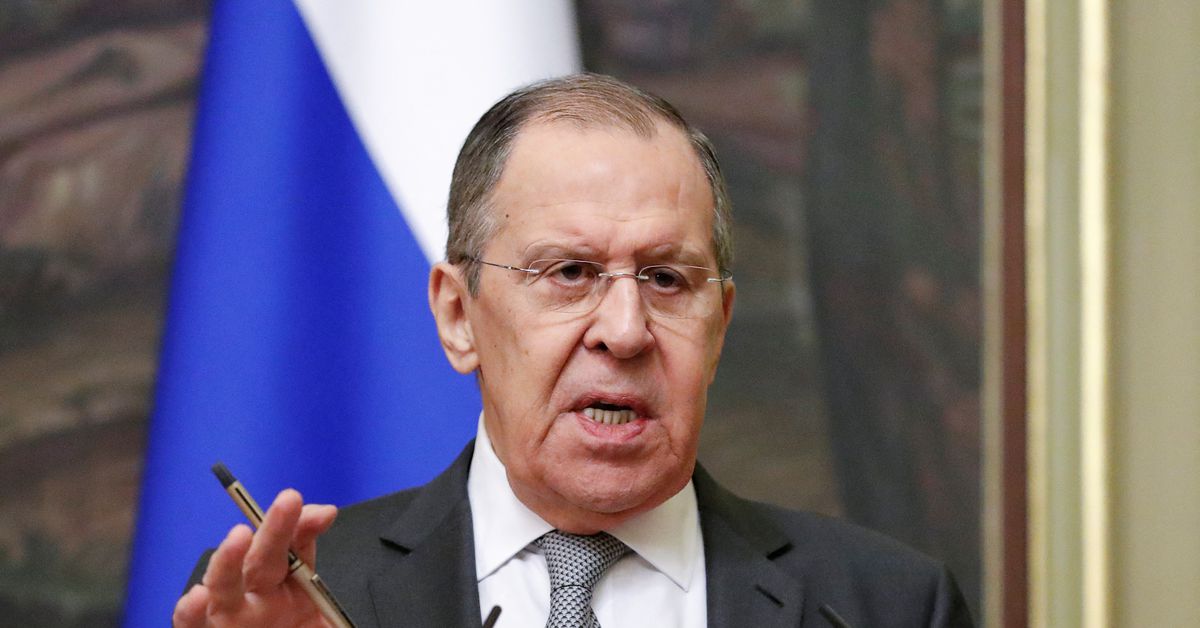
This year, Sergei Lavrov’s big meeting with students of the Moscow State Institute of International Relations included a special guest – Ambassador Muhammad Ahmad al-Jaber of the United Arab Emirates, one of six newly-minted BRICS countries invited into the bloc last month. Lavrov congratulated the UAE on its entry into the bloc.
Ukrainian Crisis
As might be expected, among the issues topping the agenda at Lavrov’s remarks was the Ukrainian crisis and NATO’s ongoing proxy war against Russia. Lavrov had several things to say about the conflict, including the “ridiculousness” of Ukrainian President Volodymyr Zelensky’s ‘peace plan’, which constitutes nothing short of an ultimatum to Russia.
“Few people took it seriously, but the West’s obsession with containing and defeating us was manifested in the fact that this absolutely ridiculous document became part of the West’s official position, which it has begun to promote using…dirty, unscrupulous methods,” Lavrov said.
Commenting on last month’s Jeddah meeting on the Ukrainian crisis, Lavrov said that the gathering, which did not include representatives from Russia, was a deliberate step by Saudi Arabia to demonstrate the “futility” of talks without Russian involvement.
“Our Saudi friends subsequently told us that they wanted to host another meeting of this format in Jeddah. They said this was being done solely in order to convey to Western participants and to Ukraine itself of the complete futility of any talks without the participation of the Russian Federation,” the diplomat said.
The Russian foreign minister also commented on Western politicians’ regular promises to support Ukraine for “as long as it takes.”
“We discussed this with our colleagues in an informal setting at the BRICS summit. They asked me: how long do you think they will have to support Ukraine in order for it to win on the battlefield? I said: I can’t hazard a guess, but there are examples in history – look how long it took them in Iraq, how long it took them in Afghanistan, to achieve their goals. I think the answer is clear here,” Lavrov said, referring to the US and NATO’s forced withdrawal from Iraq and Afghanistan after decades of occupation and spending trillions of dollars, with little to show for it.
Lavrov also highlighted the UN’s involvement in the meetings focusing on the Zelensky formula, recalling how, at last month’s BRICS summit in Johannesburg, he confronted UN chief Antonio Guterres on the summit’s sidelines and told him in a frank manner that UN participation “violates all the principles of the work of the secretariat, which, according to the Charter, must be impartial and should not receive instructions from any government.”
New, Fairer World Order Will Take Time to Build
Another major topic of interest relates to the ongoing processes to create a fairer and more just world order – processes which Lavrov admitted were “impossible to predict” in terms of the amount of time necessary for their implementation.
“This is not the rotation of the Earth, which is subject to astronomical laws, nor other processes in the field of exact sciences. A lot depends on the role of the individual in history,” Lavrov said.
Some countries have leaders seeking to “perpetuate” their countries’ global dominance. Others “understand the need to unite efforts, and that there are a large number of risks and threats common to all of humanity, and that they can only be dealt with jointly, and by developing methods to overcome them that will meet everyone’s interests,” he said.
One example of these conflicting interests is the so-called “green transition,” where Western countries have walked back on their climate commitments, ramping up the use of coal amid the energy crisis while continuing to try to force Africa and other nations in the developing world to make a speedy transition, without providing the resources necessary to do so.
“Nothing has been done. When we met in the framework of BRICS, many colleagues recalled” Western promises to assist African countries – to the tune of $10 billion a year, “which were simply forgotten,” against the background of lavish Western assistance to Kiev over the past year and a half, Lavrov said.
Fortunately, Lavrov said, even in the West there is a gradual, quiet swelling of more and more “sober voices” “calling for compromises – agreements which will take into account the interests of all countries without exception in both the security and economic spheres,” and for “the abandonment of diktat, which has never brought about anything good.”
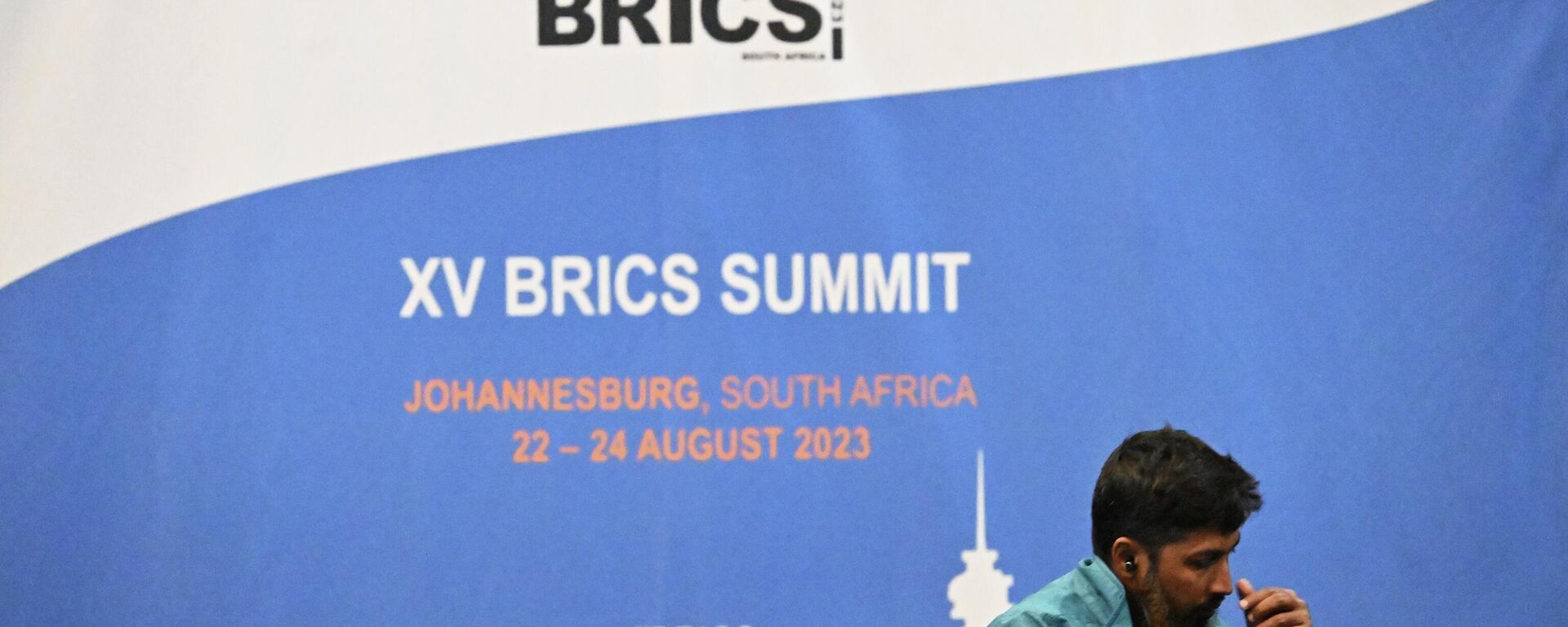 BRICS Summit 2023 – Sputnik International, 1920, 01.09.2023
BRICS Summit 2023 – Sputnik International, 1920, 01.09.2023
BRICS Can Create Viable Currency Options as Dollar Dethroned – US Economist Sachs
Multipolarity Inevitable
Lavrov stressed that the gradual movement of the world toward multipolarity is an “unstoppable” and “objective course of history.”
“It’s difficult to say how long the transition will last. It was thought that the era of Western dominance, which lasted for about 500 years, would be eternal. But it is coming to an end,” Lavrov said. “The formation of a multipolar world order will take a long time, it may be a long historical epoch, but this process is objective and cannot be stopped.”
In its place will be a new, more sustainable world order with “very deep historical roots,” and one which “reflects objective reality” – based on the fact that new centers of powers who want a greater sense of agency in international relations, and who reject the old principles applied by the old colonial powers seeking “to live at the expense of others.” Russia, for its part, will support these trends, Lavrov added.
Naturally, he said, the West will try to continue “trying to slow down the course of history,” and to create new “confrontational situations, additional difficulties for the world community.”
“The West is very much undermining the institutions of global governance. This is also one of the reasons why more and more people want to join BRICS, the SCO and look for ways to solve emerging economic and financial problems, bypassing any structures where the West is present. This is not a fast process, but reflections on this matter are expanding in the world community,” he said.
At the same time, Lavrov downplayed the idea that Russia is seeking to bring the United States and its dollar to “ruin,” emphasizing that Washington’s own policies are responsible for its decline.
“We are building our policy not against the US, not against the West. The president also spoke about this: we do not want to ruin the dollar, but the US is ceasing to provide a role for the dollar which was acceptable to everyone. That’s the problem,” he said, referencing the use of the American currency to support aggressive sanctions campaigns.
 Outer Space – Sputnik International, 1920, 23.08.2023
Outer Space – Sputnik International, 1920, 23.08.2023
Indian PM, S. Africa President Hail BRICS Expansion and Space Projects, Slam Dollar Hegemony 23 August, 11:25 GMT
Today, Lavrov noted, none of the so-called reserve currencies – be it the dollar, the euro or even the yen, have proven themselves reliable, with Russia and its partners successfully turning to alternatives, including settlements in local currencies.
“If I’m not mistaken, last year 76 percent of trade and settlements between the countries of the Eurasian Economic Union were carried out no in dollars, but primarily in national and friendly currencies. This year a rate of 90 percent is expected. Therefore, while the process of dedollarization was not an independent goal put forward during the creation of the Eurasian Economic Union…given the actions of the United States, which violated all the principles of the functioning of a market economy which had been promoted by them for many decades, in this situation, of course, we must protect ourselves…”
G20 Summit
Turning to the upcoming 2023 G20 summit, which will kick off in New Delhi next Saturday, Lavrov emphasized that Moscow will refuse to adopt any declaration of the summit if Russia’s position and interests are not taken into account amid attempts by Western countries to “Ukrainianize” the gathering.
“One would think that the issue is closed. But no, during the Indian presidency, which will hold about 200 useful events relating to various sectors of the world economy, the environment, investment issues, settlement mechanisms, and finance, the West raised the topic of Ukraine at each of these events.”
“The Russian Federation will not agree to adopt a G20 summit declaration if it does not reflect Russia’s position on global crises,” Lavrov said, noting that if Western powers have “decided to rewrite the G20’s mandate” to deal with international crises, Russia can remind them of other conflicts underway today “which are rooted in the wars unleashed by the West. If they want, let’s discuss everything,” he said.
Otherwise, Lavrov noted, Russia is working under the auspices of India’s presidency of the event, and sees the summit theme chosen by Delhi – international unity, as absolutely correct.
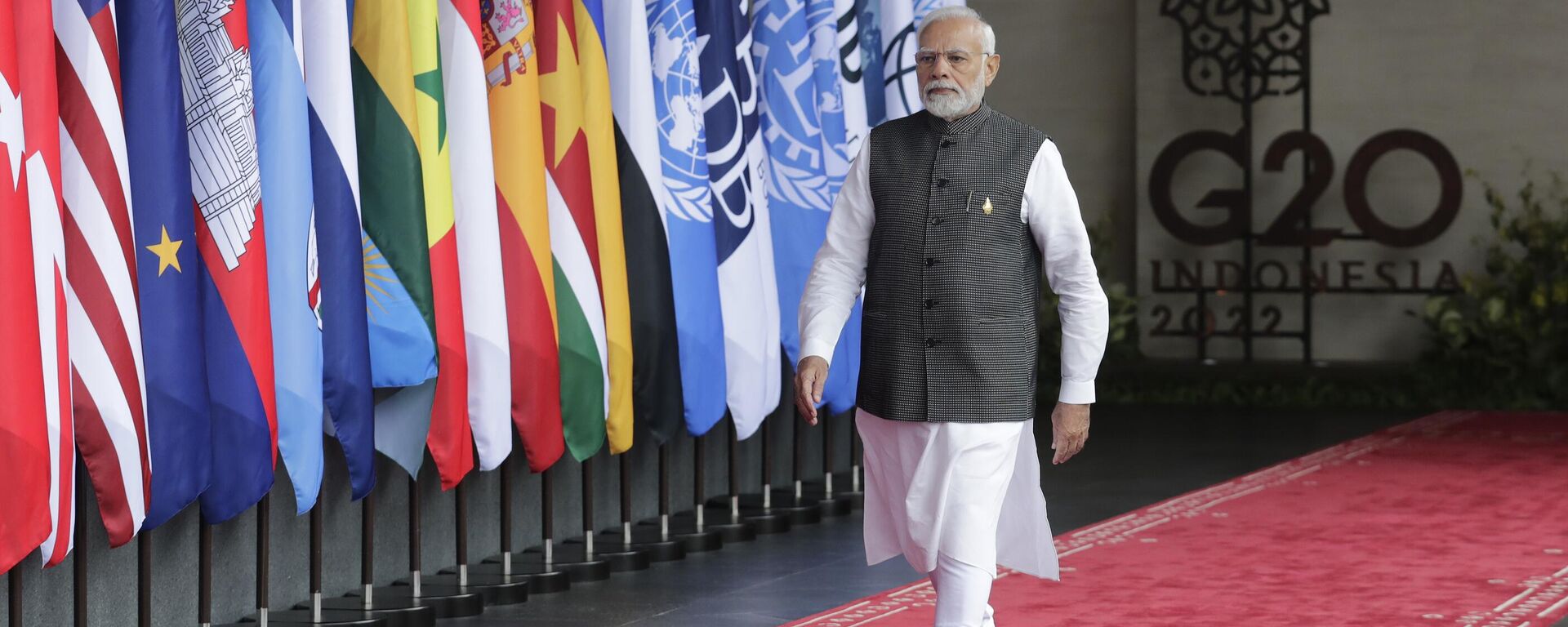 Indian Prime Minister Narendra Modi arrives during the G20 Summit in Nusa Dua, Bali, Indonesia, Tuesday Nov. 15, 2022. – Sputnik International, 1920, 31.08.2023
Indian Prime Minister Narendra Modi arrives during the G20 Summit in Nusa Dua, Bali, Indonesia, Tuesday Nov. 15, 2022. – Sputnik International, 1920, 31.08.2023
Syrian-Turkish Roadmap to Peace
Lavrov also commented on the ongoing negotiations on the normalization of relations between Syria and Turkiye – a prospect which emerged earlier this year after Damascus successfully normalized ties with its Arab neighbors. The Syrian government has made normalization contingent on the withdrawal of all Turkish troops from Syrian soil.
“We handed over a draft roadmap [on the normalization of Syrian-Turkish relations, ed.] to all our colleagues in June of this year. It is now under consideration, contacts are ongoing to bring it to a state acceptable by all, for when this project could be approved,” Lavrov said. The foreign minister recalled that in addition to Russia, Syria and Turkiye, Iran also joined the process.
Lavrov revealed that in informal contacts, Russia proposed that Syria and Turkiye return to the spirit of cooperation of the 1998 Adana Agreement, which allowed Turkish forces to send troops to deal with a terrorist threat in Syria, on the condition that it be approved by Damascus. “This agreement continues to operate, no one has denounced it,” Lavrov said.
The continued “illegal” US presence in northeast Syria is a roadblock to normalization efforts, Lavrov said. “It is the United States that to a decisive extent feeds the separatism of radical Kurdish organizations, which are designated by the Turks as a threat to their security, therefore these processes are connected,” he said.
Russia Won’t Rule Out Cooperation With West, But Focusing on New Poles
Commenting on the future of relations between Russia and the West, Lavrov emphasized that even if Western countries suddenly suggested a return to “more or less normal contacts,” Moscow would think twice about doing so. “We will not engage in interaction with the West in areas upon which our security depends, including military-political security, economic and technological security,” he said.
In the meantime, Russia will continue to ramp up its cooperation with its non-Western partners, including India, Iran, China, the UAE, Saudi Arabia and African countries.
“These plans are concrete. They are realistic. And they are already yielding impressive results in terms of increasing trade turnover, investment and contacts in other areas, including cultural, humanitarian and sport,” he said.
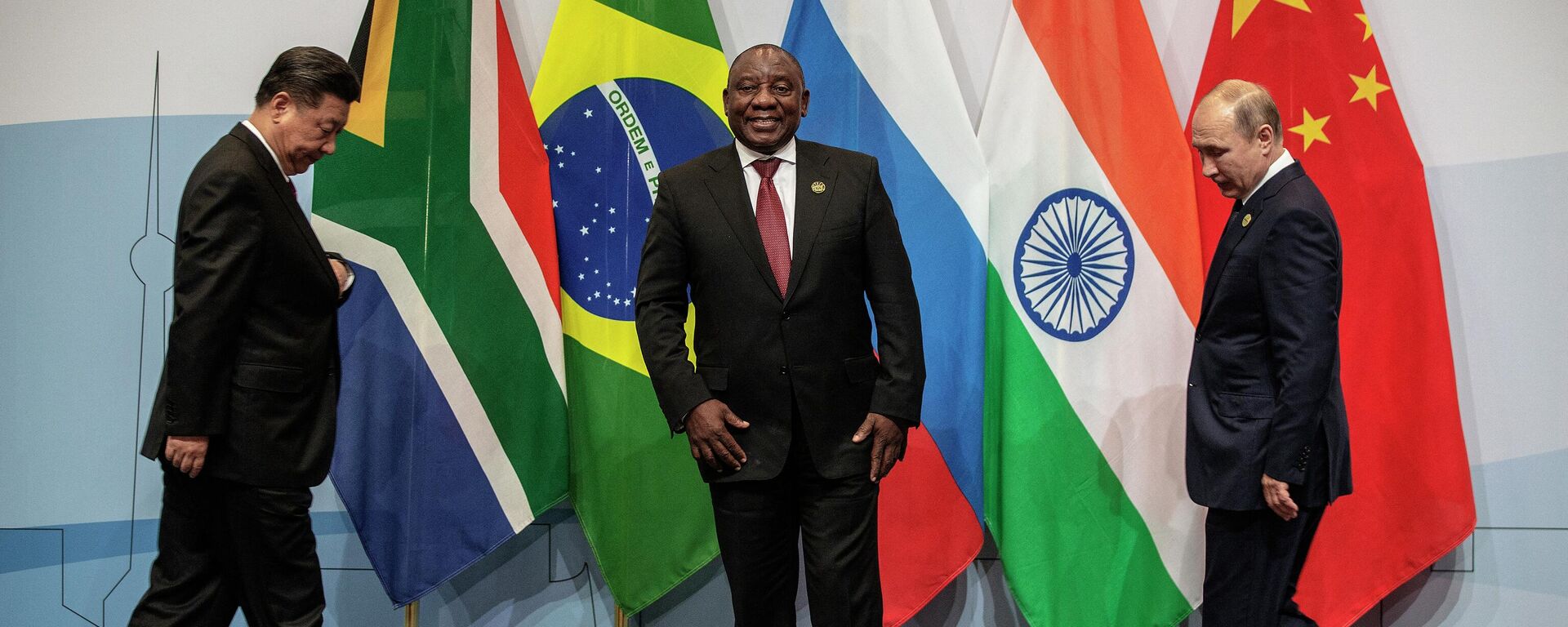 (LtoR) China’s President Xi Jinping, South Africa’s President Cyril Ramaphosa and Russia’s President Vladimir Putin arrive to pose for a group picture during the 10th BRICS (acronym for the grouping of the world’s leading emerging economies, namely Brazil, Russia, India, China and South Africa) summit on July 26, 2018 at the Sandton Convention Centre in Johannesburg, South Africa. – Sputnik International, 1920, 21.08.2023
(LtoR) China’s President Xi Jinping, South Africa’s President Cyril Ramaphosa and Russia’s President Vladimir Putin arrive to pose for a group picture during the 10th BRICS (acronym for the grouping of the world’s leading emerging economies, namely Brazil, Russia, India, China and South Africa) summit on July 26, 2018 at the Sandton Convention Centre in Johannesburg, South Africa. – Sputnik International, 1920, 21.08.2023
Pepe Escobar: BRICS Plus-SCO Super Bloc vs. US Empire 21 August, 15:00 GMT
As for any lingering hopes to return relations between Russia and the West to what they were before the Ukrainian crisis, these are “built on sand,” Lavrov said. “The policy of the West, the course proclaiming the aim of inflicting a strategic defeat of Russia, will not disappear anywhere in the foreseeable future. And we understand this very well,” he stressed.
The experience of the past 30 years has shown that Western countries, in a bid to restrain the development of their competitors, will not hesitate to misuse any agreements that have been reached.
“None of the fundamental agreements that were concluded with the West after 1991 were fulfilled. Not a single one,” Lavrov summed up.
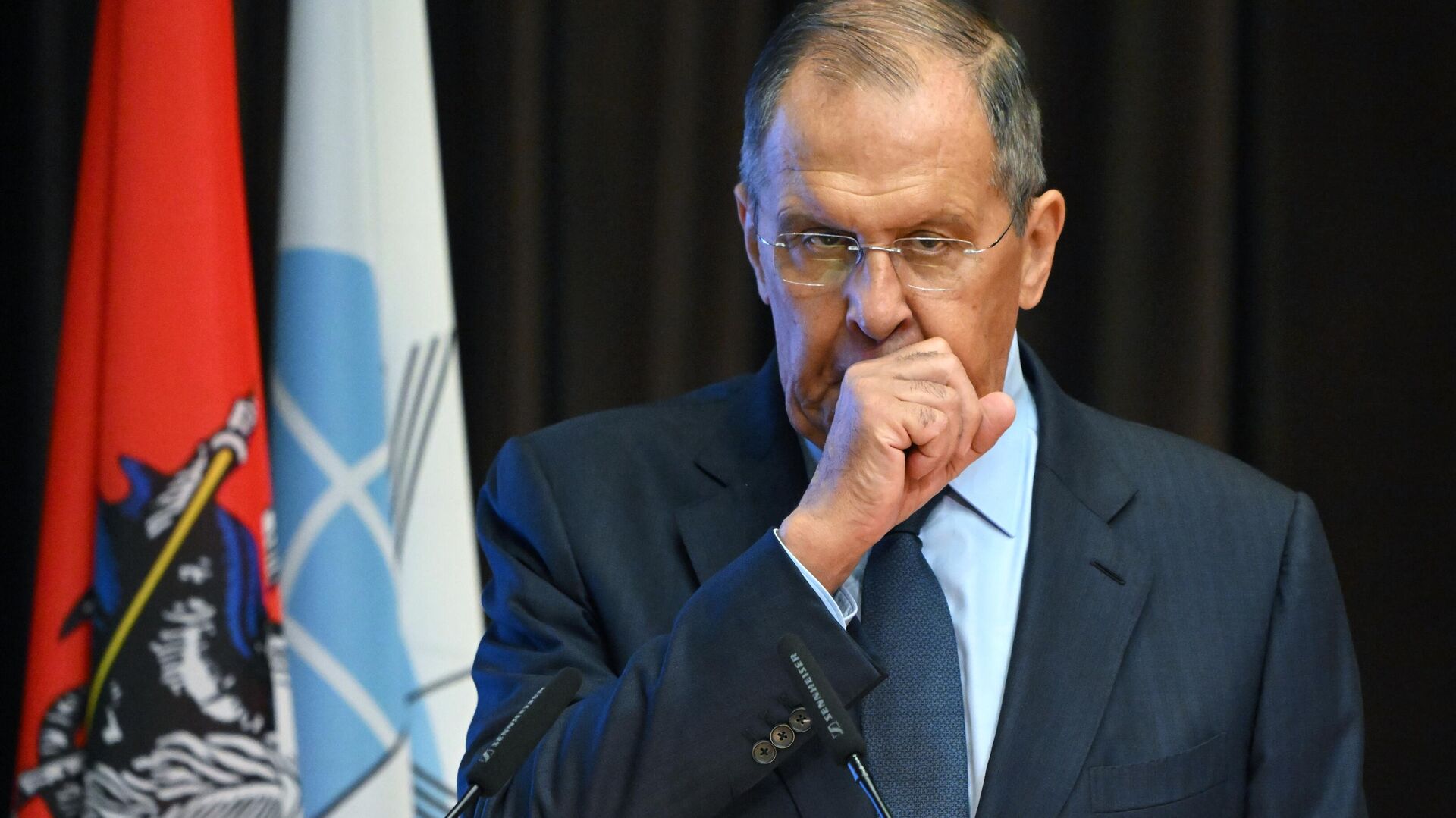
By Ilya Tsukanov
Published by Sputnik Globe
Republished by The 21st Century
The views expressed in this article are solely those of the author and do not necessarily reflect the opinions of 21cir.com
